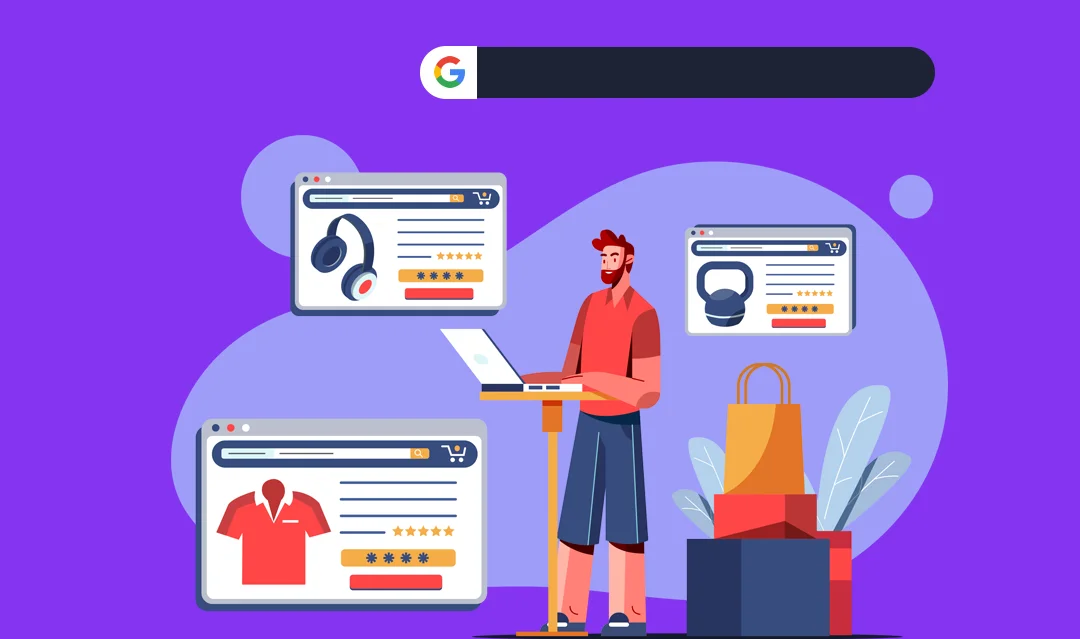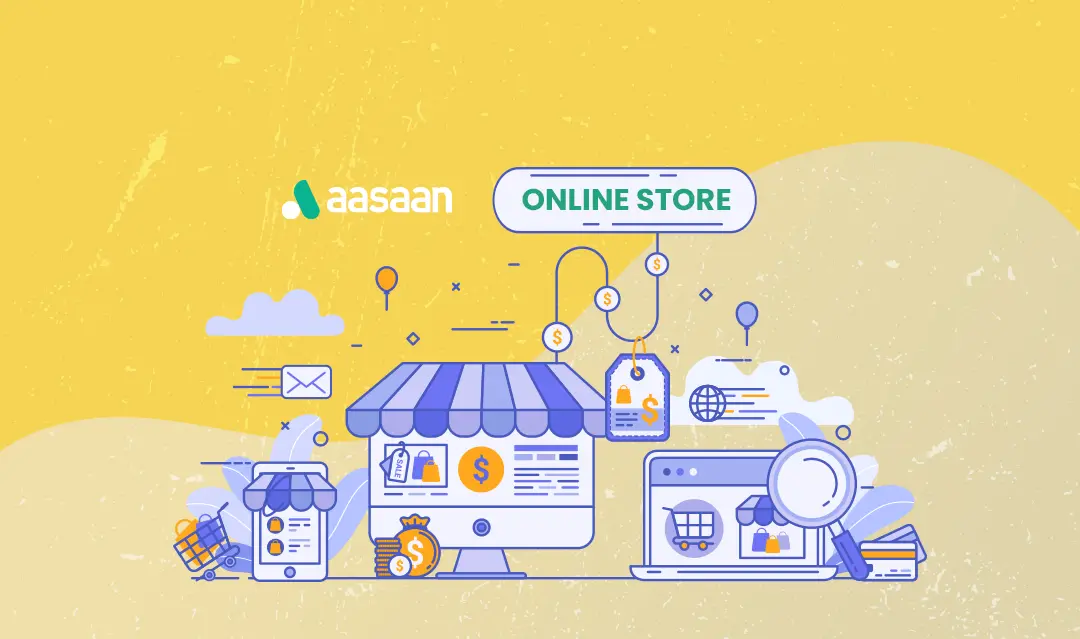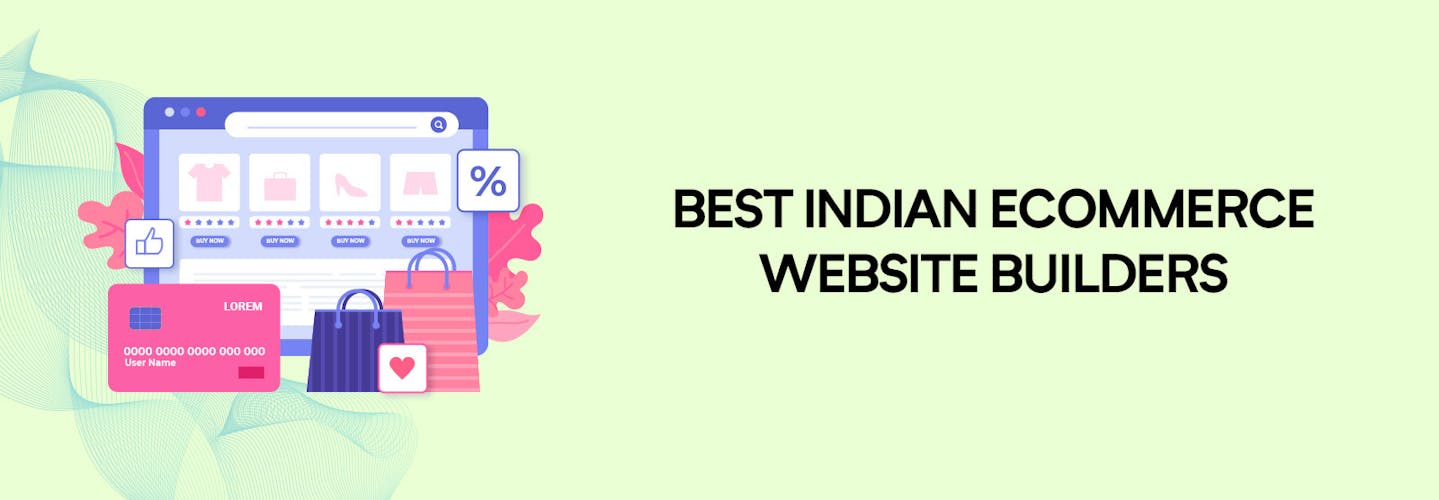
Building Your E-commerce Site in India: A Comprehensive Guide to Indian Ecommerce Website Builders
In recent years, ecommerce has become an increasingly important sector of the Indian economy. As more and more people access the internet, businesses are recognizing the need to have an online presence.
Having an ecommerce website allows businesses to reach a wider audience and tap into the growing trend of online shopping. Additionally, it provides customers with greater convenience and accessibility, enabling them to shop from the comfort of their own homes.
To meet this growing demand, numerous Indian ecommerce website builders have emerged. These platforms provide businesses with the tools and resources they need to create an online store, manage inventory, and process payments.
By using these ecommerce website builders, businesses can establish a strong online presence and compete in the rapidly expanding ecommerce landscape of India.
Factors to Consider Before Choosing an Indian Ecommerce Website Builder
When choosing an ecommerce website builder, there are several factors that businesses should consider to ensure they select the right platform for their needs.
1. Cost and pricing plans:
It’s essential to consider the cost of the platform and the pricing plans available. Businesses should select a website builder that offers plans that fit their budget and business requirements.
2. Ease of use and customization options:
The platform should be user-friendly, with intuitive navigation and customization options. Businesses should select a website builder that allows them to customize the design and layout of their site without requiring coding skills.
3. Integration with payment gateways:
Payment gateway integration is crucial for ecommerce websites. The website builder should support multiple payment gateways and offer secure transactions for customers.
4. SEO-friendliness:
SEO optimization is essential for online visibility and attracting customers. The platform should be optimized for search engines, with features such as customizable metadata and the ability to create SEO-friendly URLs.
5. Customer support:
Businesses should select an ecommerce website builder that offers reliable customer support, with multiple channels for getting in touch, such as email, phone, and live chat. This will ensure any issues or concerns can be resolved quickly and efficiently.
8 Best ecommerce platforms in india:
1. Aasaan:
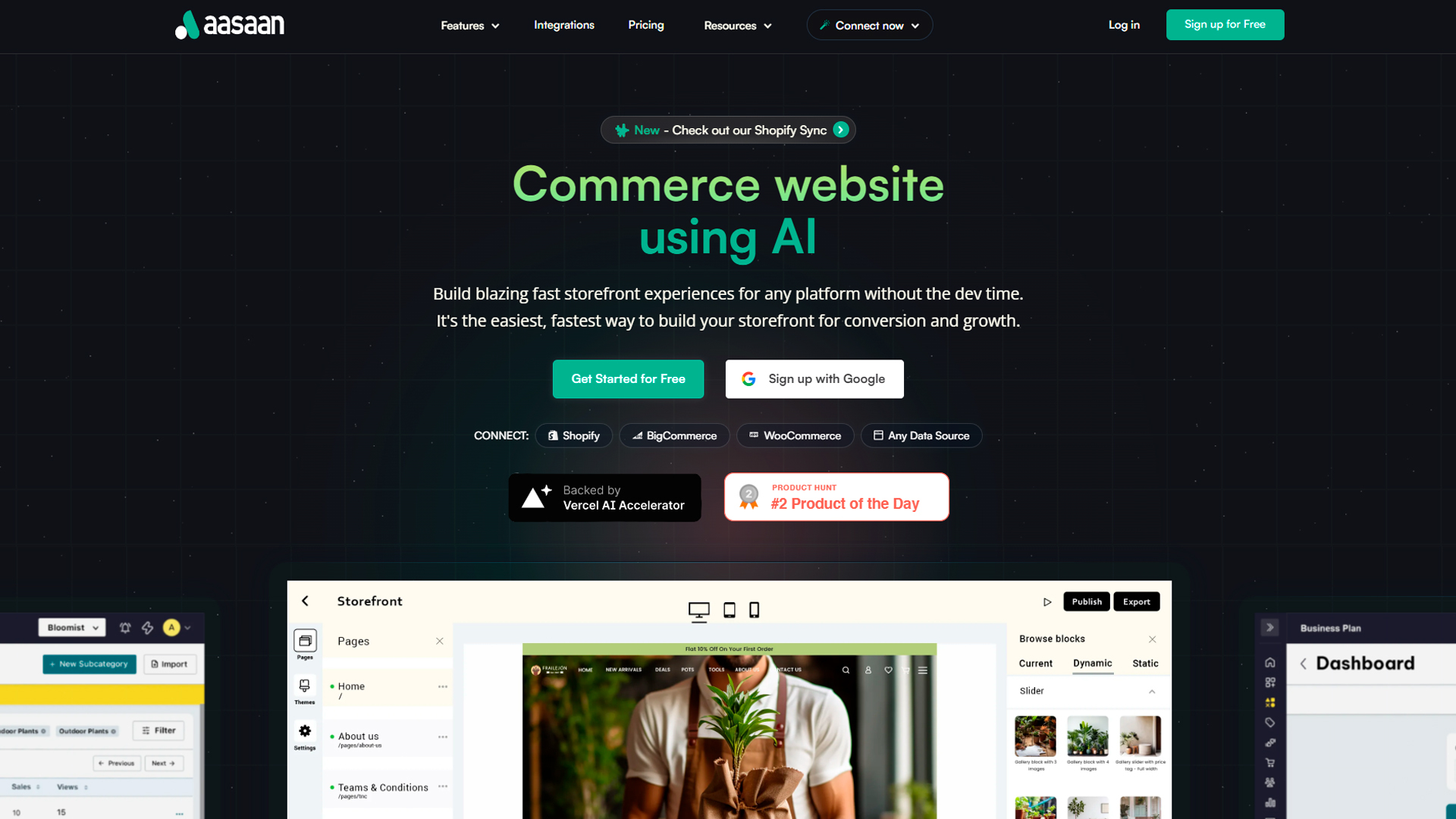
Aasaan is the ultimate website builder that gives you total control over your web pages. You can easily and quickly customize every detail, from blocks and layouts to your brand’s style guide.
You don’t have to worry about breaking anything, as Aasaan keeps all the links and integrations between different software systems working perfectly.
You can also enhance your homepage, blog page, payment page, checkout page and more with our simple and powerful tools. Plus, your customers will love our fast and smooth checkout process.
And you can boost your site’s functionality with various apps for payments, shipping analytics, customer support and more.
Finally, you can manage your orders and analytics with one app and get the insights you need to grow your ecommerce business.
With aasaan you can create user-friendly website , and that allows for custom URLs, automatic sitemap generation, and specific SEO settings at the product/category level or Page level.
Don’t miss this opportunity to take your ecommerce to the next level with Aasaan.
2. WooCommerce:
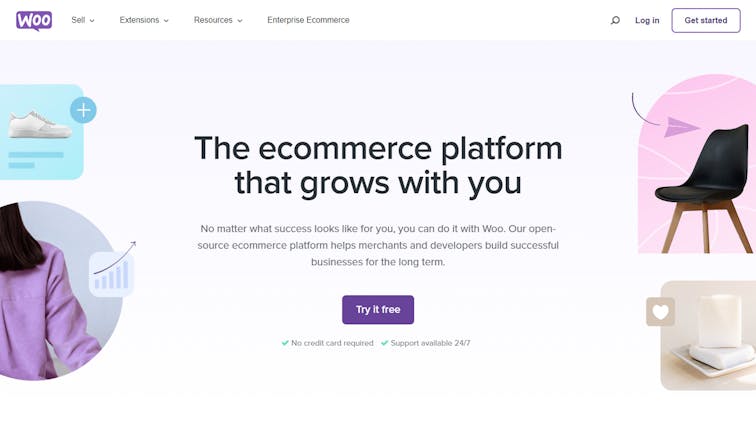
WooCommerce is a popular open-source ecommerce platform designed for WordPress, making it an ideal choice for businesses with existing WordPress websites or those familiar with the platform.
WooCommerce offers a range of features, including extensive customization options and access to thousands of plugins and extensions, to help you create the perfect online store.
As a self-hosted solution, WooCommerce requires hosting, security, and maintenance, which may require additional technical skills or hiring a dedicated support team. However, the platform’s affordability and the ability to scale make it an attractive option for many businesses.
Along with built-in SEO tools and analytics, WooCommerce supports multiple payment gateways and can be easily integrated with popular shipping methods and marketing tools for a seamless ecommerce experience.
A large community of users and developers provides resources and support to help you grow and manage your store effectively.
3. Shopify:

Shopify is a popular and globally trusted e-commerce platform that offers a comprehensive range of tools and features to create and manage a successful online store. It comes with various pricing plans, allowing businesses to choose one that best fits their needs and budget.
Shopify also provides a variety of design templates and themes, as well as an extensive app store with numerous third-party integrations to help extend the functionality of your online store.
The platform integrates seamlessly with multiple payment gateways and offers secure transactions for customers. It also has built-in SEO features and analytics to help you optimize your store’s visibility and track your store’s performance.
4. Bigcommerce:
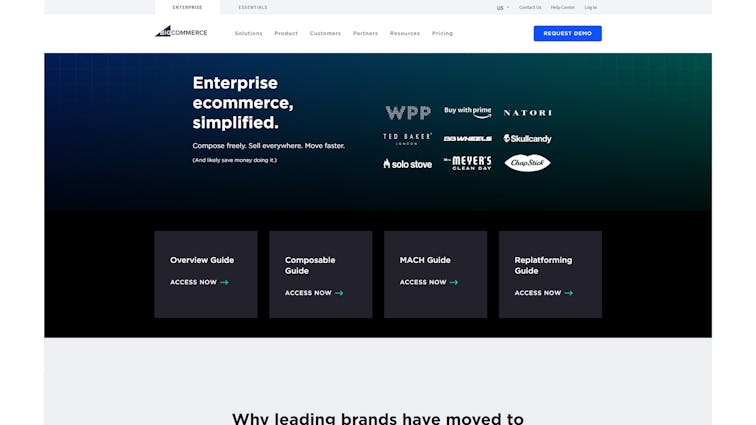
BigCommerce is another well-known ecommerce platform that enables businesses to create and manage their online stores with ease. It offers a range of pricing plans and customizable design templates to suit various business requirements and preferences.
BigCommerce provides a wealth of features like product management, order processing, inventory management, along with integrations for multiple payment gateways and popular marketing tools.
SEO-friendliness is a significant advantage of BigCommerce, as it comes with features like customizable URLs, metadata, and automatic sitemap generation to improve your store’s search engine rankings. Reliable customer support and a thriving community forum further add to the platform’s appeal.
5. Wix Ecommerce:
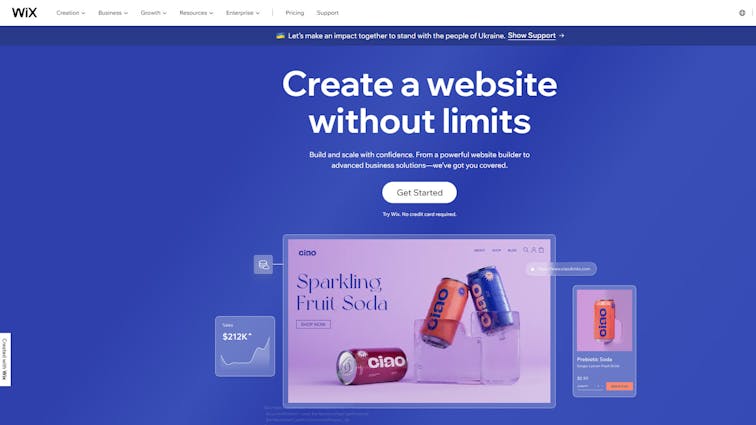
Wix Ecommerce is another popular choice for building and managing e-commerce websites. Known for its ease of use and extensive customization options, Wix Ecommerce allows businesses to create visually appealing and user-friendly online stores without any coding knowledge.
Offering a wide range of templates and design options, the platform also includes built-in SEO tools and features to optimize your store for search engines.
Integration with multiple payment gateways, shipping solutions, and marketing tools ensures smooth operations and improved customer experience
6. Zoho Commerce:
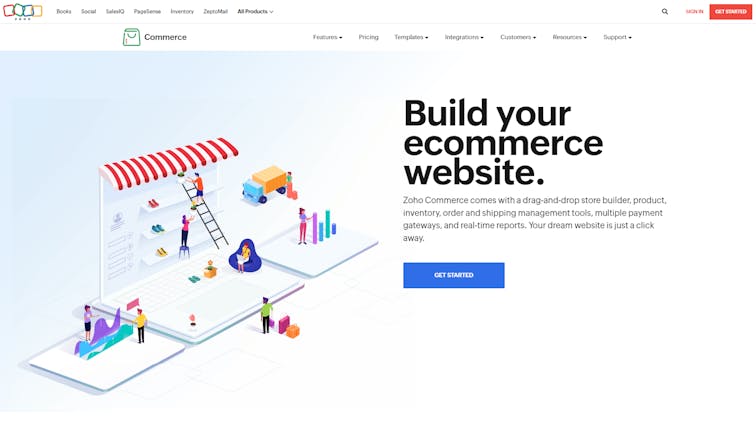
Zoho Commerce is part of the Zoho ecosystem, which provides a suite of software solutions for various business needs.
As an e-commerce website builder, Zoho Commerce offers a range of features and tools to create and manage your online store efficiently. With its affordable pricing plans, it targets small and medium-sized businesses.
Zoho Commerce provides customizable templates and an easy-to-use drag-and-drop design interface, allowing merchants to create unique and eye-catching websites. The platform also supports integration with multiple payment gateways and offers secure transaction processes.
SEO-ready features and analytics tools are available to optimize your store for search engines and track its performance. Additionally, Zoho Commerce offers 24/7 customer support through chat, email, and phone.
7. Magento:
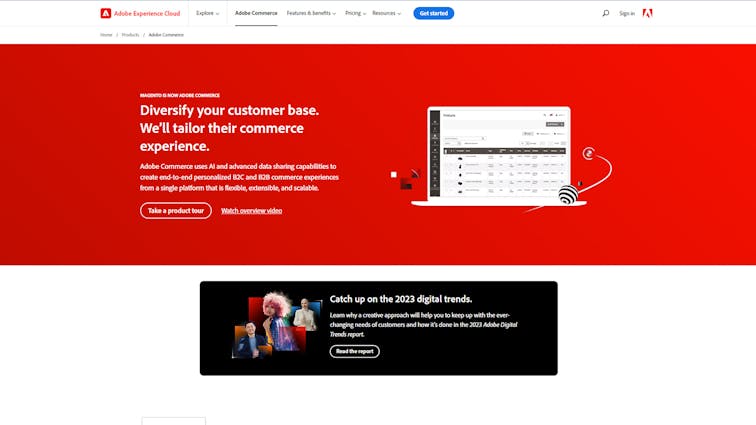
Magento is a powerful, flexible, and customizable open-source ecommerce platform geared towards medium to large-sized businesses that require more extensive features and scalability.
Magento offers a robust set of tools, including inventory management, product variations, order management, and marketing tools, among others.
It supports multiple currencies, languages, and shipping providers, making it an excellent choice for global online stores.
With Magento, you also get access to numerous plugins and themes that can further extend the capabilities of your store, and its built-in SEO features can significantly improve the visibility of your site on search engines.
The platform requires a certain level of technical expertise to set up and manage, and security updates and maintenance may need additional support resources.
However, Magento has a thriving community and a wide range of professional services available to provide assistance and guidance.
8. PrestaShop:

PrestaShop is a popular open-source ecommerce platform with a focus on ease of use and scalability.
Targeting particularly small and medium-sized businesses, PrestaShop offers a feature-rich platform with complete customization capabilities and an extensive library of modules to extend functionality.
Out-of-the-box SEO features, integrations with various payment gate ways and shipping providers, and support for multiple languages and currencies make it a reliable solution for online stores catering to a diverse audience.
Additionally, the platform offers built-in analytics tools to monitor store performance and guide marketing efforts for maximum reach and visibility.
PrestaShop’s user-friendly interface facilitates website design and management even for those with limited technical knowledge.
However, as a self-hosted solution, users must set up hosting, security, and maintenance, which could require additional expertise or external support resources.
PrestaShop boasts a robust community that offers support, modules, and ready-to-use themes, further enhancing the platform’s appeal to ecommerce-driven businesses.
Features to Look for in an Indian Ecommerce Website Builder
When choosing an ecommerce website builder, businesses should look for certain features to ensure they select a platform that meets their needs.
1. Customization options:
Customization is essential for businesses to create a unique online store that stands out from the competition.
The platform should allow for easy customization of the website’s design and layout to match the business’s brand.
2. Mobile responsiveness:
With an increasing number of people using mobile devices to access the internet, it’s essential for ecommerce websites to be mobile-friendly.
The website builder should provide mobile responsiveness, allowing the website to adjust to the screen size of different devices.
3. Product management tools:
Effective product management is crucial for ecommerce websites. The website builder should provide tools for businesses to manage inventory, track orders, and process payments.
4. Marketing and promotion features:
To attract and retain customers, businesses need to promote their products effectively. The platform should offer marketing and promotion features, such as email marketing tools and social media integration, to help businesses reach their target audience.
5. Security and safety measures:
Security is paramount for ecommerce websites, as customers need to provide personal and financial information.
The platform should provide adequate security measures, such as SSL encryption and secure payment gateways, to protect customer data and ensure safe transactions.
How to Choose the Right Ecommerce Website Builder for Your Business
Choosing the right Indian ecommerce website builder is crucial for the success of your online business. Here are some steps to follow to help you make the right choice and build your ecommerce site:
1. Identifying your business needs:
Before selecting an ecommerce website builder, identify your business needs and what features and functionalities are essential for your online store.
2. Assessing the features and functionalities of ecommerce website builders:
Look at the features and functionalities of different ecommerce website builders and determine which ones best meet your business requirements.
3. Determining your budget:
Determine your budget for building and maintaining your ecommerce site, including hosting, domain registration, and payment gateway integration.
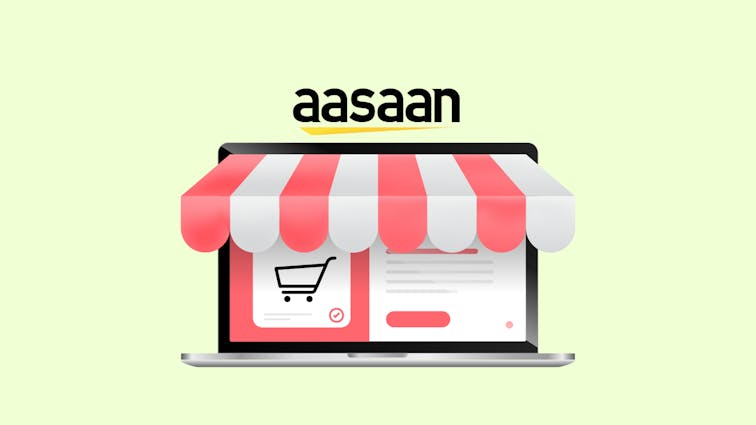
How to create Your E-commerce Site with an aasaan app
Here are the steps to setting up your online store with the Aasaan app:
- Download the app for free from the link below (available on both Android and iOS)
- Sign up to Aasaan.
- Add categories and products to your store.
- Add your payment, delivery and checkout settings.
In these 4 simple steps, your online store is ready to sell!
Best Practices for Running a Successful Ecommerce Site in India
Running a successful ecommerce site in India requires careful planning and execution. Here are some best practices to follow:
1. Optimizing your website for search engines:
SEO optimization is crucial for attracting organic traffic to your website. Ensure that your website is optimized with keywords, meta descriptions, and high-quality content to improve your website’s visibility on search engines.
2. Creating a user-friendly interface:
Your website should be easy to navigate and visually appealing. Make sure your website is mobile-friendly, with a clear layout and intuitive navigation.
3. Providing excellent customer service:
Providing excellent customer service is essential for building a loyal customer base. Respond to customer inquiries promptly, offer refunds and exchanges, and keep customers updated on the status of their orders.
4. Building trust and credibility:
Building trust and credibility is crucial for gaining the confidence of your customers. Offer secure payment options, display customer reviews and ratings, and provide a clear return policy.
5. Utilizing social media and digital marketing:
Social media and digital marketing are powerful tools for promoting your ecommerce site. Use social media platforms to engage with your customers, share content, and promote your products.
Invest in digital marketing strategies such as email marketing, pay-per-click advertising, and influencer marketing to increase brand awareness and attract new customers.

Managing and Growing Your Ecommerce Business in India
Managing and growing an ecommerce business in India requires careful attention to various factors. Here are some essential practices to follow:
1. Fulfilling orders and managing inventory:
Fulfilling orders and managing inventory is a crucial aspect of running an ecommerce business. Ensure that you have the necessary resources to handle order processing, shipping, and inventory management.
2. Analyzing sales data and metrics:
Analyzing sales data and metrics is essential for understanding your business’s performance and identifying areas for improvement. Monitor metrics such as conversion rates, customer acquisition costs, and average order value to make data-driven decisions.
3. Scaling your business and expanding your product offerings:
As your business grows, it’s essential to scale up and expand your product offerings. Consider adding new product categories, expanding your reach to new markets, and investing in marketing and advertising strategies to drive sales.
4. Building a loyal customer base:
Building a loyal customer base is essential for long-term success in ecommerce. Offer personalized customer experiences, engage with your customers through social media, and provide excellent customer service to build strong relationships with your customers.
5. Staying up-to-date with industry trends and innovations:
Staying up-to-date with industry trends and innovations is crucial for remaining competitive in the ecommerce market. Follow industry blogs and publications, attend conferences and events, and invest in emerging technologies to stay ahead of the curve.
Future of Ecommerce in India:
The future of ecommerce in India is promising, with growth projections and emerging technologies driving innovation in the industry. Here are some key points to consider:
1. Growth projections and industry trends:
The ecommerce market in India is projected to grow significantly in the coming years, driven by increasing internet penetration, smartphone usage, and consumer demand for online shopping.
2. Emerging technologies and innovations:
Emerging technologies such as AI, AR, and VR are transforming the ecommerce landscape, providing new opportunities for businesses to engage with customers and streamline operations.
3. Government initiatives and policies:
The Indian government has implemented various initiatives and policies to support the growth of ecommerce, including initiatives to promote digital payments and ease of doing business.
4. Opportunities for small and medium-sized businesses:
Ecommerce provides small and medium-sized businesses with opportunities to expand their reach and compete with larger companies, offering a level playing field for businesses of all sizes.
Conclusion:
In conclusion, selecting the right ecommerce website builder is crucial for businesses looking to establish a strong online presence and succeed in the competitive ecommerce market in India.
By keeping up-to-date with industry trends and innovations and taking advantage of government initiatives, businesses can overcome potential roadblocks and tap into the opportunities provided by the growing ecommerce market in India.
It’s important for businesses to take action and invest in ecommerce to remain competitive and achieve long-term success.
FAQ’s:
1. What is an ecommerce website builder?
An ecommerce website builder is a software platform that allows businesses to create an online store to sell their products or services. Ecommerce website builders provide a range of features, including customizable templates, payment processing, inventory management, and shipping tools, making it easy for businesses to establish an online presence and reach customers around the world.
2. How much does it cost to build an ecommerce website in India?
The cost of building an ecommerce website in India can vary depending on several factors, including the ecommerce website builder you choose, the complexity of your website design, and the range of features you require. However, businesses can typically expect to pay anywhere between INR 10,000 to INR 50,000 to set up a basic ecommerce website in India.
3. Can I use international ecommerce website builders in India?
Yes, businesses can use international ecommerce website builders in India. However, it’s important to ensure that the website builder offers support for Indian payment gateways and complies with local laws and regulations.
4. What are some popular payment gateways used in Indian ecommerce?
There are several popular payment gateways used in Indian ecommerce, including Paytm, Razorpay, PayPal, PayU, and CCAvenue. These payment gateways offer secure payment processing and a range of payment options to make it easy for customers to complete their purchases.
5. How can I promote my ecommerce website in India?
Promoting your ecommerce website in India requires a multi-faceted approach, including a combination of digital marketing strategies and traditional advertising methods. Some effective ways to promote your ecommerce website in India include:
- Utilizing social media platforms to engage with customers and promote your products
- Investing in pay-per-click advertising to drive traffic to your website
- Utilizing email marketing to reach out to customers and promote your products
- Collaborating with influencers and bloggers to promote your products to their audiences
- Offering discounts, promotions, and special deals to attract new customers and retain existing ones.



